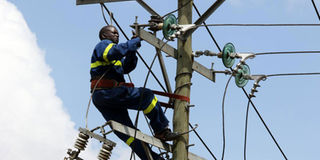The darker side of Kenya Power is out, audit its books, operations

A Kenya power technician at work in Nairobi. FILE PHOTO | NATION MEDIA GROUP
What you need to know:
The token purchase saga has received wide coverage, and understandably so.
More worrying is how Kenya Power is seemingly cooking its books by indulging in creative accounting.
The steep rise in power bills indicates that, at least part of the money is being recovered from consumers.
The Kenya Power and Lighting Co. Ltd (Kenya Power) is a byword for controversy and has been in the eye of several storms recently.
We’re not talking about some little parastatal somewhere. This is a company that supplies electricity to 6.2 million customers, private and corporate. It literally powers the country.
Kenya Power’s official mandate is “to plan for sufficient generation and transmission capacity to meet demand, building and maintaining transmission network and retailing of electricity to its customers”.
One of its core stated values is “integrity”. I asked a meter reader on a public holiday why, of all days, he had showed up. His unashamed reply was that he was earning overtime!
PRIVATE INVESTORS
This company, whose 50.1 per cent share is owned by the government and the rest by private investors, has a monopoly in power distribution and a very chequered history.
The token purchase saga has received wide coverage, and understandably so. Most consumers are reliant on it. As one bitterly told me, “each token we buy is worth less and less”. But an interview with CEO Ken Taurus (Sunday Nation, April 22) left me more confused than enlightened, especially about the complex token scheme.
But it is only one worm in a veritable can of worms. More worrying is how it is seemingly cooking its books by indulging in creative accounting.
RECOVERY
In the revenue account in its annual report and financial statements for the year ended June 2017, it shows Sh22 billion was billed for “fuel cost charges”. It then confirms under note 7b (page 143) that “a recovery of Sh22 billion (2016, Sh12.5 billion) was made”.
Yet in clause 20a, page 155, under “receivables” it shows Sh10.2 billion as recoverable fuel costs with a footnote stating, “the recoverable fuel costs, currently under a mitigation fund set up by the Energy Regulatory Commission (ERC), to be passed onto the consumers at a later date upon approval”.
The audited accounts also show on page 160, clause 27b, an equivalent amount, Sh10.2 billion, under “current liabilities” as payable to electricity suppliers, including KenGen.
FINANCIAL HOLE
It is clear it did not pass on the additional Sh10.2 billion fuel bill to consumers in FY2016/17, probably under instructions from the government and with the ERC’s knowledge.
To get out of this financial hole, Kenya Power has three options: Recover the money from the consumer in the current year and the next with higher tariffs, obtain a subsidy from the government or default on payments to its suppliers.
The steep rise in power bills indicates that, at least part — if not all — of the money is being recovered from consumers.
Kenya Power owes the country and its consumers a full explanation, backed with the relevant figures. It needs to make clear how much of this money is being recovered from the consumers per se. The suspicion is that the consumer will bear the brunt of this anomaly.
TOKEN SAGA
This — coupled with the token saga, complicated billing structure, 19 per cent technical and commercial losses on the LV network, around 25,000 outages and 250 transformer failures each month — shows clearly Kenya Power is in dire need of a massive overhaul.
There is a need for an independent forensic audit into its technical operations and finances by professional external bodies, obviously in conjunction with the Auditor-General.
With related companies, entities and activities such as the Geothermal Development Corporation, Kentraco, the Rural Electrification Programme, KenGen and the ERC, and of course the Kenya Nuclear Electricity Board, it goes without saying that the Ministry of Energy should also be audited.
There is one additional sobering point: Power generation and electricity supply are cornerstones of the economy and are vital for its health and growth.
Mr Shaw is a public policy and economic analyst. [email protected]





